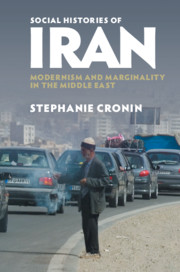‘Cronin combines her detailed knowledge of social history of Iran and the Middle East with new readings of E. P. Thompson, Eric Hobsbawm, and Michel Foucault. The result is a remarkably fresh look at the history of the Middle east and diaspora, where events that happened in the region, whether bread riots or campaigns for unveiling, cease to be explicable only by the history of that nation, and become instead one example of a much bigger global story.’
Janet Afary - University of California, Santa Barbara
‘In this most exciting study of social history of Iran, Cronin provides a masterful comparative contextual framework for understanding how social change, and exchange, takes place and exposes the international pressure points impacting the complex processes of change in social relations. Packed with historical insights and deep theoretical reflections, in this book Cronin displays her profound knowledge of the processes of social change as experienced by vulnerable communities.’
Anoush Ehteshami - Durham University
‘Scholarship on the history of the Middle East tends to be state centered, urban concentrated and elite driven. Cronin breaks with that habit. Using an array of sources, Cronin opens a panoramic window into the lives of those who were both (neglected) victims and agents of change in Iran and the wider Middle East. A model for future research on Middle Eastern societies beyond high nationalism, this is an innovative and theoretically sophisticated book.’
Rudolph Matthee - University of Delaware
‘Cronin de-centers elites and national borders to write layered, interconnected, and expansive social histories on topics ranging from abolitionism in the Middle East to the 1979 Iranian revolution. This book exemplifies the power of a global framework of analysis when applied thoughtfully and with erudition.’
Naghmeh Sohrabi - Brandeis University
'Every chapter is rich in detail, supplemented by footnotes that serve as a wonderful guide to the social history literature in Persian and English, and a 28-page bibliography. The introductory chapter is an excellent, detailed summary of the book’s theses. Recommended.'
P. Clawson
Source: Choice
‘This book is a beautiful example of how to integrate Iran and the MENA into global and comparative history. It demonstrates the benefits and insights such an approach offers to historians in general, and to historians of modern Iran in particular.’
Sivan Balslev
Source: The American Historical Review
‘This book is a significant contribution to the comparative literature on subaltern social histories of modernity in Iran and elsewhere.’
Kaveh Ehsani
Source: Labor and Working-Class History
‘… an excellent reference handbook suitable for graduate and upper-division undergraduate courses on Middle East, world, and transnational history. … highly recommended reading to specialists and advanced students in Iranian, Middle Eastern, and world history.’
Afshin Matin-asgari
Source: Journal of Holy Land and Palestine Studies
‘Cronin is a trailblazer of comparative Iranian studies. Cronin’s work vis-à-vis the broader body of Middle Eastern studies is corrective and experimental. … it will prove valuable for upcoming scholars in the field of Middle Eastern studies.’
Takin Raisifard
Source: Left History



